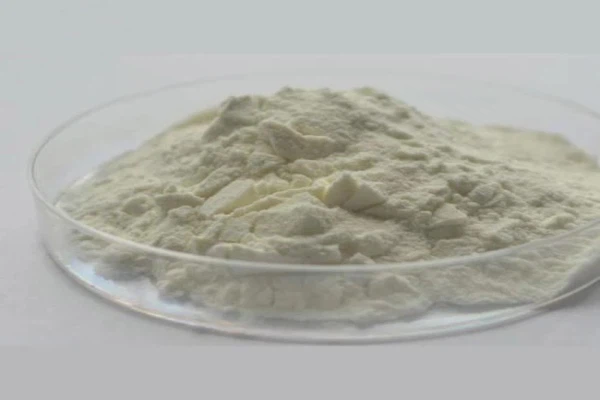What is Natamycin in Food? Uses & Safety
May 09, 2024
Natamycin, a natural antifungal agent derived from the bacterium Streptomyces natalensis, plays a crucial role in food preservation, ensuring the safety and quality of various food products, such as cheese, sausage, baked goods, wine, and yogurt, etc. In this article, we'll explore the multifaceted nature of Natamycin – from its specification and properties to its diverse applications in food preservation, along with safety considerations and proper usage guidelines.
What is Natamycin (E235)?
Natamycin, also known as pimaricin, is a polyene macrolide antibiotic renowned for its potent antifungal properties. It is available in the form of a white to yellowish powder or granule, with a characteristic odor. Natamycin exhibits excellent stability over a wide range of PH and temperature conditions, making it an ideal choice for food preservation applications.

Specification And Properties Of Natamycin
1. Specification: The CAS number of Natamycin is 7681-93-8. And its chemical formula is C33H47O13N. The molecular weight of it is 665.74
2. Appearance: Natamycin presents itself as a white to yellowish powder or granule with a distinct odor.
3. Solubility: Natamycin exhibits limited solubility in water, a characteristic that influences its application in food preservation. While sparingly soluble in water, Natamycin shows better solubility in organic solvents like ethanol and acetone.
4. Antifungal power: One of Natamycin's most notable properties is its powerful antifungal activity. Derived from the bacterium Streptomyces natalensis, Natamycin targets the cell membranes of fungi, disrupting their structure and inhibiting their growth. This mechanism of action makes Natamycin highly effective against a broad spectrum of molds and yeasts commonly encountered in food production and storage.
What Is Natamycin Used For?
Natamycin finds diverse applications in the food industry, thanks to its versatile nature and broad-spectrum antifungal activity. Some of its primary uses include:
►Cheese Production: Natamycin is a staple in cheese production, where it is applied as a surface coating to prevent mold growth on cheese surfaces, ensuring the quality and safety of cheeses like blue cheese, Brie, and Camembert.
►Dairy Products: In yogurt, sour cream, and other dairy products, Natamycin serves as a safeguard against yeast and mold contamination, extending shelf life and maintaining product freshness.
►Baked Goods: Natamycin is utilized in the bakery industry to inhibit fungal growth in bread, cakes, and pastries, preserving their texture and taste throughout storage and distribution.
►Meat and Poultry: When applied to the surface of meat and poultry products, Natamycin acts as a protective barrier, preventing mold growth and spoilage, thereby enhancing product quality and safety.

How To Use Natamycin?
Natamycin is typically applied as a surface treatment or incorporated directly into food products during processing. The dosage and application method vary depending on factors such as the type of food product, desired level of protection, and regulatory requirements. Food manufacturers adhere to established guidelines and best practices to ensure the safe and effective use of Natamycin in their products.
Is Natamycin Safe For Humans?
Natamycin is considered safe for consumption when used in accordance with regulatory guidelines and good manufacturing practices. Extensive safety assessments conducted by regulatory authorities, including the FDA and EFSA, have confirmed its safety profile and established acceptable daily intake levels. Natamycin poses no significant health risks to consumers when used as a food additive within specified limits.
What Precautions Should Be Taken When Using Natamycin?
When using Natamycin (E235) as a food preservative, several precautions should be taken to ensure its safe and effective application:
1. Adhere to Approved Dosages: Follow recommended dosage levels provided by regulatory authorities and manufacturers to prevent overuse or underuse of Natamycin. Exceeding recommended levels may compromise food safety and quality.
2. Proper Application Methods: Employ appropriate application methods, such as surface coatings or direct incorporation, based on the specific food product and intended use of Natamycin. Ensure thorough and even distribution of Natamycin to achieve optimal efficacy.
3. Avoid High Temperatures: Natamycin is sensitive to high temperatures, which can degrade its effectiveness. Avoid exposing Natamycin-treated food products to excessive heat during processing, storage, and transportation to preserve its antifungal properties.
4. Storage Conditions: Store Natamycin in a cool, dry place away from direct sunlight and moisture to maintain its stability and potency. Follow storage recommendations provided by manufacturers to prevent degradation and ensure product efficacy.
5. Monitor Shelf Life: Check the expiration date of Natamycin to ensure its viability and efficacy. Dispose of expired or deteriorated Natamycin products according to proper waste disposal guidelines.
6. Labeling Requirements: Clearly label food products containing Natamycin to inform consumers of its presence and comply with regulatory labeling requirements. Provide accurate information regarding Natamycin usage to facilitate informed consumer choices.
7. Monitor for Adverse Reactions: Regularly monitor food products treated with Natamycin for any signs of adverse reactions, such as changes in taste, texture, or appearance. Promptly investigate and address any issues to ensure food safety and consumer satisfaction.
By following these precautions, food manufacturers can effectively utilize Natamycin as a food preservative while ensuring the safety and quality of their products. Additionally, adherence to regulatory guidelines and good manufacturing practices is essential to maintain compliance and consumer confidence in Natamycin-treated foods.

FAQs
Is Natamycin a Natural Source?
Yes, Natamycin is considered a natural product as it is derived from the bacterium Streptomyces natalensis, which is found in soil. The production of Natamycin involves fermentation of the bacterium to produce the desired compound, which is then purified for use as a food preservative. Because Natamycin is derived from a natural source and undergoes minimal processing, it is often regarded as a natural food additive.
Is It Halal?
Natamycin is generally considered halal for consumption by many Islamic authorities due to its natural source and production process. However, individuals seeking halal certification for food products containing Natamycin should consult with relevant authorities or certification agencies for specific guidance.
Is It Kosher?
Yes, Natamycin is considered kosher by many kosher certification agencies and authorities. Kosher refers to food products that adhere to Jewish dietary laws (Kashrut). Natamycin is typically considered kosher because it is derived from a natural source (the bacterium Streptomyces natalensis) and does not contain any non-kosher ingredients.
Is It Vegan?
Yes, Natamycin is considered vegan-friendly. It is derived from a naturally occurring bacterium, Streptomyces natalensis, and does not involve the use of animal-derived ingredients or processes in its production. Therefore, Natamycin aligns with vegan dietary preferences and is suitable for consumption by vegans.
Is It Gluten Free?
Yes, Natamycin is gluten-free. It is a natural compound derived from the bacterium Streptomyces natalensis and does not contain gluten or gluten-containing ingredients. Therefore, Natamycin is safe for individuals with gluten intolerance or celiac disease to consume.
Final Thoughts
Natamycin stands as a reliable guardian of food safety and quality, offering effective protection against fungal contamination in a wide range of food products. Its versatility, stability, and safety make it an indispensable tool for food manufacturers. As the demand for safe and sustainable food preservation solutions continues to grow, Natamycin remains a trusted ally in the quest to preserve the integrity and freshness of our food supply.
Founded in 2006, CHEMSINO is a leading food preservatives supplier. Our products cover Natamycin (E235), Calcium Propionate (E282), Potassium Sorbate (E202), Sodium Diacetate (E262), Sodium Benzoate (E211), etc. Welcome to consult us for best preservation solutions for your food production for free. We have experienced experts answer your questions online timely.
You Might Also Like
-

Vanillin CAS NO. 121-33-5
-

Bread Improver Datem High Acid Value CAS NO. 100085-39-0
-

Emulsifier GMS High Iodine Value CAS NO.31566-31-1
-

Reuse, Reduce, Recycle: Propylene Glycol Esters PGMS40% A...
-

PGMS90%: The Key To Formulating Stable, High-Quality Phar...
-

The Benefits Of Using Polysorbates Liquid Polysorbate 40 ...
